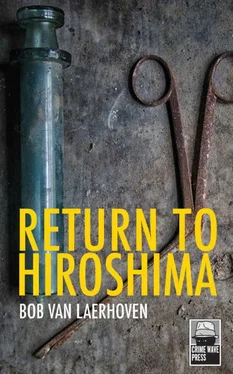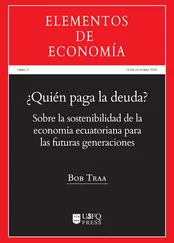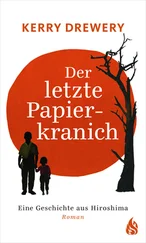Hiroshima – Adachi’s apartment near the Peace Tower – Adachi, Yori and Becht – night, March 14 th – 15 th1995
Dr Adachi parks in front of his apartment feeling ill at ease for not noticing the chrysanthemum tattoo earlier. But his conscience is clear: when the corpse of the baby arrived in the mortuary he had only glanced at it. He had no time to be exhaustive. He had noticed the dead infant’s deformities and made a mental note to do an autopsy later. The fuss generated by the bank raid simply got in the way. Yet he’s still annoyed at the way things turned out. He’s been trying to reach Takeda on the police uhf radio but there’s been no response. He’s probably with the Shiga family. Takeda doesn’t own a mobile phone: too big, too heavy, too unreliable. He does have a beeper, but Adachi doesn’t know the number. The police doctor has a two-way radio in his living room, operating on the police frequency. During the lonely hours, with only a bottle for company, he listens in to his colleagues’ messages and fantasises romantic tragedies behind their calls. He decides to try the inspector again later. As soon as he walks into the living room he senses the tension between the two women. The German seems frustrated, Yori dispirited.
The photographer gestures apologetically when she sees Adachi raise an eyebrow. “I tried to explain an idea I had for a photo. I wanted to shoot her at the foot of the Peace Monument with a doll in her arms, one with a chrysanthemum tattoo.” Becht points to a magazine with a photo of a chrysanthemum. “For one or other reason it made her really nervous. Her English isn’t good enough to explain what’s upsetting her. I think it has to do with a girlfriend…” the photographer stops speaking when she sees Adachi raise both eyebrows.
“You want to take a picture of her holding a doll in her arms with a chrysanthemum tattooed on its right heel?”
The German appears defensive. “I wanted to take a series of photos, actually. Start with a wide view then move in on her hand, a close-up – without glove – and the doll, which I would first scorch black. I saw a picture of a deformed baby the other day on the cover of a Japanese magazine and it made me think of my father who…”
Adachi turns to Yori and asks what’s going on. Before she answers, she grabs her bag and pulls out a pile of old documents. The first is rubberstamped Dai Nippon Teikoku Rikugun , the emblem of the “Land Forces of the Great Japanese Empire,” governed by the department that was referred to during the Second World War as the Ministry of War instead of the Ministry of Defence.
Hiroshima – Saijo – Takeda, Nagai Shiga and his wife – night, March 14 th – 15 th1995
Nagai Shiga’s head sinks to his chest when inspector Takeda tells him about the charges his son is facing. “When he was still small, my wife read him the story of the carp that turns into a dragon. She must have read it hundreds of times,’ he says, his eyes focused on the polished wooden floor in which his reflection is like a pale stain in the varnish. “I remember her voice as if it was yesterday, and his enthusiastic whoops of encouragement. The carp was expected to do the most impossible things to achieve its dream. How can a fish become a dragon? But the carp was determined. He tried the impossible. He failed time and again. But he refused to give up. When I arrived home one evening Reizo hurled himself at me, a five-year-old bundle of energy: “Daddy, the carp turned into a dragon!’ He almost fell over himself from the excitement. I asked him what the carp was going to do now that it had become a powerful dragon. Reizo looked up at me; in the light of the room his eyes were black: ‘Make everyone dead who doesn’t listen to him’.”
Nagai Shiga withdraws into a long silence, staring at his cup of tea. Inspector Takeda thanks his lucky stars his marriage is childless. Then he reconsiders: perhaps a child would have helped make up for some of the things that happened in his youth.
Takeda hears a barely audible sigh at his back as Nagai Shiga’s small, trim and classically dressed wife enters the room. Takeda is surprised by the tautness of her face. Her voice is close to a whisper: “My carp became a dragon.”
Hiroshima – Adachi’s apartment near the Peace Tower – Adachi, Yori and Becht – night, March 14th – 15th 1995
Adachi translates the gist of what Yori had told him about the tall, mysterious woman who had joined the Suicide Club a few days earlier. Beate Becht listens attentively. The story reminds the police doctor of his father, a doctor at Kyoto’s military hospital where his mother worked as a nurse. Adachi’s father had moved up the ranks to major. He had told him of rumours he had picked up about experiments carried out during the Second World War in laboratories in Tokyo and other secret locations, experiments on prisoners involving a secret military organisation called Unit 731. The maruta – the prison guards mockingly referred to the prisoners as “logs of wood” that were to fuel the fire of Japan’s success – were infected with typhoid and bubonic plague, among other things, and then injected with experimental substances to see what would happen. Adachi’s father also told him about decapitations after which the prisoner’s heart was ripped out of his body to see how long it would continue to beat. His father had dismissed the rumours as malignant enemy indoctrination. But a brief inspection of the documents Yori had given him had convinced Adachi that the rumours were more than rumours. His heart skipped a beat when he read about the background of the person on whom the court physician of the emperor himself had conducted experiments in 1932. Adachi doesn’t know what to think. He’s pretty sure the documents are authentic. Yori’s story about her giant of a girlfriend is bizarre to say the least and hard to believe. But as alcoholic, discrete homosexual and police doctor, Adachi has heard plenty of true stories that sound unbelievable when they’re repeated.
“Why did you try to tell the gaikokujin all this?” he asks Yori, making sure he uses the correct word for female foreigner. There was a possibility that the German photographer might recognise the word gaijin and take offence. Westerners often think gaijin sounds racist. As a member of a minority that the Japanese tend to look down on, Adachi avoids offending others as a matter of course.
“Because Mitsuko asked me to go public with her story shortly before she disappeared. She’s convinced her father will find her sooner or later and she’s not sure if she’s up to the confrontation. I ran away from Reizo that same day. He had flipped his lid. I didn’t know where to go. My parents are both dead. The only person I could think of was Beate. I heard her mention the name of her hotel when we were at the hospital reception.”
Adachi sighs. The number of people being left behind by the worst economic crisis Japan has had to face since the Second World War is increasing by the day. But he still has to make an effort not to picture the present generation as spoiled and spineless. When his father found out Adachi was homosexual he called him a ketsuman, a vulgar and abusive term meaning “ass cunt”. In a drunken rage he had grabbed a scalpel and threatened to give his son a “real” cunt. Adachi turns to Yori who’s staring at the floor, a look of resignation on her face. He feels sorry for her. If he’s properly understood everything she told him and she hasn’t been lying too much, she was a wildcat before they met, young and reckless. Now she’s terrified of being locked up because her boyfriend did something crazy with a foreigner. If truth be told, she’s more scared of her friend than she is of jail. Adachi thinks the youth of today read too many mangas and are addicted to video games that glorify violence.
Читать дальше












